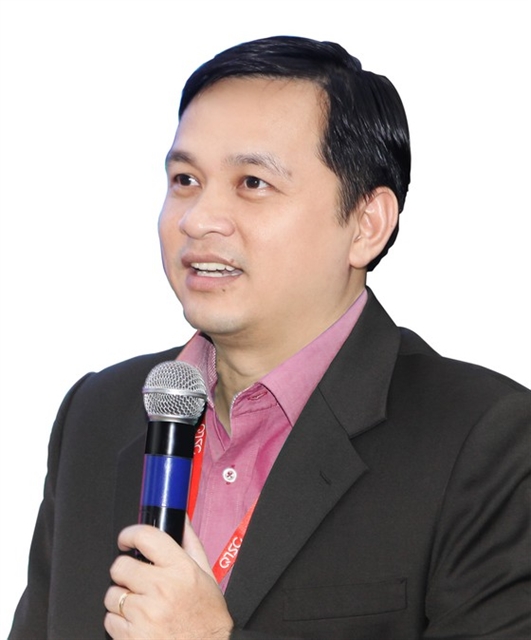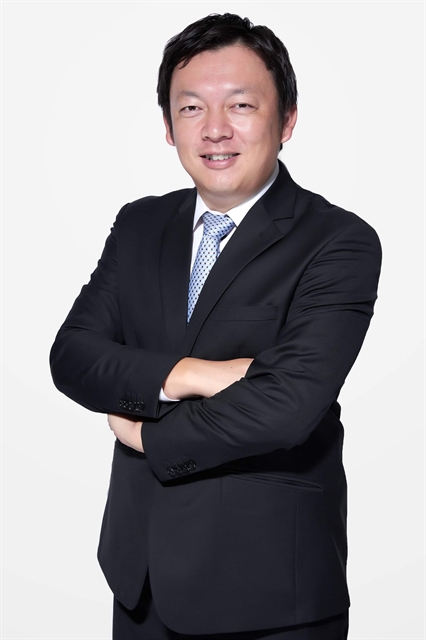
DXCenter, a centre which provides consultation and support for individuals and businesses in digital transformation, is currently being built in downtown HCM City. Lâm Nguyễn Hải Long, CEO of Quang Trung Software City Development Co. Ltd. (QTSC), speaks to Sài Gòn Giải Phóng (Liberated Sài Gòn) newspaper about DXCenter’s role and its benefits for businesses, residents, and the city’s Digital Transformation Scheme.
What is the main role of the DXCenter project?
The HCM City People’s Committee last April assigned QTSC to collaborate with the departments of Information and Communications and Science and Technology to carry out a project to set up DXCenter. Last month QTSC reported on the centre’s construction progress to chairman of the People’s Committee Nguyễn Thành Phong.
QTSC is assigned to establish and manage DXCenter so as to take advantage of available resources in the community and reduce dependence on financial and staff resources from the Government.
Operating as a science and technology organisation, the centre will adopt an autonomy model that will make cooperation with domestic and international partners more flexible.
In the first phase, DXCenter will focus on efforts to carry out the city’s Digital Transformation Scheme and assist small and medium-sized enterprises (SMEs) in the adoption of new technology.
Located on No. 6 Tú Xương Street in HCM City’s District 3, DXCenter is scheduled to be put into operation in the third quarter this year.
How can DXCenter operate effectively?
In order to operate effectively, DXCenter needs to gather a pool of experts in various industries and have strong linkages with IT and business communities. It also needs to develop relationships with trade organisations, incubation centres and consulates, as well as domestic and international organisations and corporations.
DXCenter has a prime location downtown, making it convenient for individuals and enterprises to visit and seek support.
I believe that with the rich expertise and experience from its staff, DXCenter will learn from lessons of other centres and operate effectively.
How can DXCenter support the city’s Digital Transformation Scheme?
This month DXCenter will form many groups of experts in major industries and put in place action plans for each group, and create connections with leading IT enterprises and IT associations.
Domestic and international IT enterprises are invited to showcase their products and solutions, such as digital economy, digital infrastructure, e-government and e-society.
Products and solutions will be digitalised on the DX-eHub platform with integrated functions such as ratings, reviews, and demos.
We target providing at least 1,000 products and solutions in digital transformation and 100 digital transformation models in different fields.
The centre will work closely with the departments of Information and Communications and Science and Technology to implement key tasks outlined in the city’s Digital Transformation Scheme.
What benefits can individuals and enterprises enjoy with the operation of DXCenter?
DXCenter will prioritize serving SMEs and organisations seeking support for digital transformation, and digital businesses seeking potential customers for digital transfer.
State agencies in districts seeking to adopt new technology to serve the public will also be given priority.
It also provides support for locals and educational establishments that want to learn about digital transformation and cooperate in training human resources in digital transformation.
It supports activities in digital transformation, including consultation and support for adoption of digital solutions, as well as digital community development and promotion of research and development in digital products and solutions.
Digital transformation, a must in these new normal times

Ryohei Oda, managing director of ABEAM Consulting Vietnam, a global consulting firm that helps companies take on the challenge of achieving transformative change amid the digital age, speaks about the need for digital transformation amid the COVID-19 outbreak.
In the context of the unpredictable COVID-19 pandemic, what advice do you have for manufacturing businesses for optimising personnel and working shifts while ensuring social distancing?
We believe that remote work can be a solution.
Remote work using information and communication technology removes time and place constraints. However, the manufacturing sector faces a challenge of having many business operations ‘with time and place constraints.’
Manufacturing workers can be categorised into three: engineers and technical and office workers.
Hence, though employees belong to the same company, there is a large difference in the content of work, and the difficulty in doing remote work differs by category.
First of all, remote work is most difficult for engineers since they are engaged in assembly and quality control at manufacturing sites. It is basically impossible to work without factory facilities.
‘Technical worker’ jobs include design, product development and research. For technical workers there are many obstacles to working remotely that need to be cleared, such as information leaks and equipment problems.
In the manufacturing sector, remote work is relatively easy for ‘office workers’ in departments such as human resources and general affairs as long as there is an internet connection.
Furthermore, introduction of business chat, online meeting tools, task management tools, etc., can promote team-based projects.
The key to success in remote work lies in understanding the current (As-Is) operation and define the ideal state (To-Be) to be realised by remote work. We recommend defining both short and mid-long terms.
In the short term office and technical workers can work remotely since their work can possibly be done without special facilities. The key factor is information security. All the operations/tasks should be carefully determined and effective counter measures such as reform of business processes and rules, implementation of security tools and employee training should be applied.
In the mid-long term, the remote work target can be expanded to the entire company including the factory. Thanks to the development of new technologies, many factory manufacturing processes can be automated (i.e. smart factory). This can support remote work by engineers as well.
What challenges do enterprises face in achieving digital transformation?
Firstly, DX is different from digitisation or digitalisation. DX is one step ahead as its goal is not just optimising or improving the existing business by digital technology but to create innovative new services and products using digital technology.
In this pandemic situation, large enterprises are having difficulty transforming their business within a short time due to the complexity involved.
On the other hand, SMEs are much more flexible and nimble to challenge something new and transform themselves. We believe this epidemic is a big chance for SMEs to take advantage since large companies are struggling to transform themselves to adapt to the new normal situation.
ABeam Consulting can advise those companies and determine their DX journey based on the accumulated practices of many clients in several industries and countries. VNS
Xem thêm: lmth.noitamrofsnart-latigid-rof-ertnec-sdliub-ytic-mch/742579/ymonoce/nv.swenmanteiv